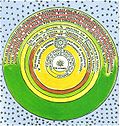Universe
Universe
The universe is the totality of space, time, matter, and energy. It encompasses everything that exists, from the smallest subatomic particles to the largest galaxies. The universe is governed by the laws of physics and is constantly expanding.
Origin and Evolution
The prevailing cosmological model for the origin of the universe is the Big Bang theory. According to this theory, the universe began approximately 13.8 billion years ago from an extremely hot and dense state and has been expanding ever since. The cosmic microwave background radiation is a remnant of the early universe, providing evidence for the Big Bang.
Structure
The universe is composed of galaxies, which are collections of stars, gas, dust, and dark matter. These galaxies are organized into clusters and superclusters, forming a vast cosmic web. The Milky Way is the galaxy that contains our Solar System.
Composition
The universe is made up of ordinary matter, dark matter, and dark energy. Ordinary matter includes atoms and molecules, while dark matter is a mysterious substance that does not emit light but exerts gravitational forces. Dark energy is thought to be responsible for the accelerated expansion of the universe.
Theories and Models
Several models attempt to describe the universe's structure and behavior. The Standard Model of particle physics explains the fundamental particles and forces, while general relativity describes the gravitational interaction on a cosmic scale. The Lambda-CDM model is the standard model of cosmology, incorporating dark energy and cold dark matter.
Future of the Universe
The ultimate fate of the universe is still uncertain. Several scenarios have been proposed, including the Big Freeze, Big Crunch, and Big Rip. These outcomes depend on the properties of dark energy and the overall density of the universe.
Related Pages
References
- Peebles, P. J. E. (1993). Principles of Physical Cosmology. Princeton University Press.
- Weinberg, S. (2008). Cosmology. Oxford University Press.
Gallery
Transform your life with W8MD's budget GLP-1 injections from $125.
W8MD offers a medical weight loss program to lose weight in Philadelphia. Our physician-supervised medical weight loss provides:
- Most insurances accepted or discounted self-pay rates. We will obtain insurance prior authorizations if needed.
- Generic GLP1 weight loss injections from $125 for the starting dose.
- Also offer prescription weight loss medications including Phentermine, Qsymia, Diethylpropion, Contrave etc.
NYC weight loss doctor appointments
Start your NYC weight loss journey today at our NYC medical weight loss and Philadelphia medical weight loss clinics.
- Call 718-946-5500 to lose weight in NYC or for medical weight loss in Philadelphia 215-676-2334.
- Tags:NYC medical weight loss, Philadelphia lose weight Zepbound NYC, Budget GLP1 weight loss injections, Wegovy Philadelphia, Wegovy NYC, Philadelphia medical weight loss, Brookly weight loss and Wegovy NYC
|
WikiMD's Wellness Encyclopedia |
| Let Food Be Thy Medicine Medicine Thy Food - Hippocrates |
Medical Disclaimer: WikiMD is not a substitute for professional medical advice. The information on WikiMD is provided as an information resource only, may be incorrect, outdated or misleading, and is not to be used or relied on for any diagnostic or treatment purposes. Please consult your health care provider before making any healthcare decisions or for guidance about a specific medical condition. WikiMD expressly disclaims responsibility, and shall have no liability, for any damages, loss, injury, or liability whatsoever suffered as a result of your reliance on the information contained in this site. By visiting this site you agree to the foregoing terms and conditions, which may from time to time be changed or supplemented by WikiMD. If you do not agree to the foregoing terms and conditions, you should not enter or use this site. See full disclaimer.
Credits:Most images are courtesy of Wikimedia commons, and templates, categories Wikipedia, licensed under CC BY SA or similar.
Contributors: Prab R. Tumpati, MD

















